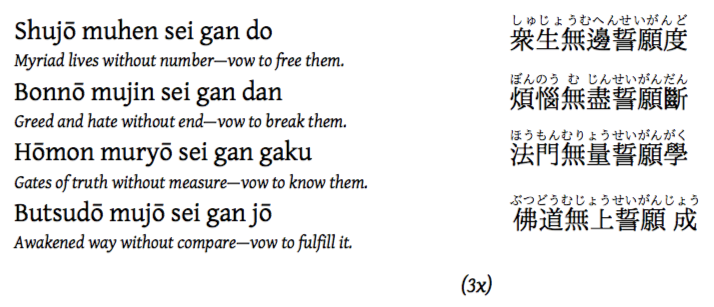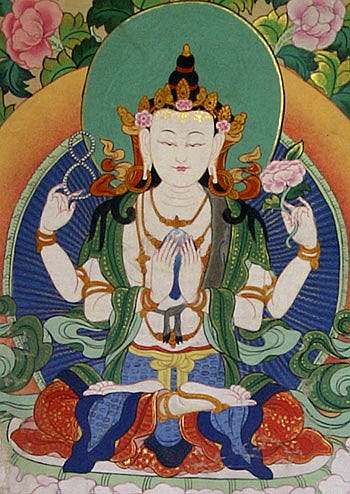Today, I am taking Bodhisattva vows.
The ceremony will be conducted by Shinzen Young and Soryu Forall. Shinzen Young originally inspired me to start a daily meditation practice with a talk he gave at Google, Divide and Conquer: How the Essence of Mindfulness Parallels the Nuts and Bolts of Science. His blog also alerted me to the Center for Mindful Learning’s residential program, now known as the Monastic Academy. Soryu Forall is the founder and head teacher at the Monastic Academy, and my primary teacher. I will be taking the vows alongside my friends, Harrison Heyl, Steven Dee (also known by his internet handle, mrdomino), and Christopher Russell.
The ceremony is a lay ordination ceremony. It is deeply influenced by Buddhist tradition, but also adapted to our culture by Shinzen Young (and our monastic tradition with the help of Soryu Forall). We will take the Five Precepts, and the four Bodhisattva vows. We have also all elected to take dharma or spiritual names. Moreover, since we are part of the Monastic Academy, we will receive brown shawls that signify our commitment.
I am not sure yet what my name will be. I do know that it will end in “shin.” In Shinzen’s tradition, from his base temple, Shinnō’in, there is a one character overlap in each generation, between teacher to student. So the first character of his name, 真, will become the second character of my name. I asked Forall to choose the first character of my name. This seemed like a way to honor his teachings and our relationship. Although I will have a new name, you are welcome to call me it or my birth name, Michael.
Although today will be April 1st, this ceremony is not a joke. When we picked the date, Shinzen said “it’s auspicious in that it’s both Easter (death and resurrection) and April Fool’s Day (practitioners shouldn’t take themselves too seriously).”
It is a great gift that we can participate in such a ceremony. It took me several years to come to the point where I was willing to participate in it. When I first saw others taking this ceremony — my friends who received the names Yushin, Taishin, and Kyoshin — they seemed so courageous, so strong. The vows they were taking seemed impossibly daunting:

I take commitment and integrity very seriously. I try to only commit to something that I know I can do — because I feel I must do it if I commit to it. And I did not believe that I could do these things: Vow to free all living beings. Vow to break endless greed and hatred. Vow to know immeasurable gates of truth. Vow to fulfill the Awakened way — the way of the Buddha.
However, I realized that while it is important and beneficial to value integrity, I had a narrow view of it, one that was crippling me. It led me to be stingy about what I would do or not do, out of fear of a loss of personal integrity, out of self-doubt, or fear that I did not know a way forward. But there are some things that only become possible when you commit to them fully, without reservations.

I am reminded of a story in Thomas Merton’s spiritual autobiography, The Seven Storey Mountain. As a young man, Merton aspired to be a writer. But he was also slowly becoming a devout Catholic. He felt a conflict between his faith and his skills, his sense of self. A friend who he admired, Lax, asked him what he wanted to be anyway. Merton knew that his true aspiration at the time was “to see himself in print,” but he felt he could not say that. So he said “I guess what I want is to be a good Catholic.” Lax asked him what he meant, and Merton gave a “lame” answer. I imagine it was something to the effect of “attend church regularly,” or something similarly banal, related to the ritual of that religion.
Lax said that what Merton should say is that he wants to be a saint. Merton, astonished, objected: “How do you expect me to become a saint?” “‘By wanting to,’ said Lax, simply.”
Merton was flooded with self-doubt and self-loathing, but Lax did not relent:
“I can’t be a saint,” I said, “I can’t be a saint.” And my mind darkened with a confusion of realities and unrealities: the knowledge of my own sins, and the false humility which makes men say that they cannot do the things that they must do, cannot reach the level that they must reach: the cowardice that says: “I am satisfied to save my soul, to keep out of mortal sin,” but which means, by those words: “I do not want to give up my sins and my attachments.”
But Lax said: “No. All that is necessary to be a saint is to want to be one. Don’t you believe that God will make you what He created you to be, if you will consent to let Him do it? All you have to do is desire it.”
I recognize the self-doubt that Merton experienced, and the deeper yearning that led him to talk to his spiritual friend, Lax. There is not such a large difference between the aspiration to be a saint and the aspiration to be a bodhisattva. Both express a commitment to being of service. “All that is necessary to be a saint is to want to be one”; all that is necessary to be a bodhisattva is to want to be one.
There are many numbered lists in Buddhism. This article has already referenced the Five Precepts and the Four Vows. As a Bodhisattva, you strive to cultivate the six perfections or pāramitās: generosity (dāna), virtue (śīla), patience (kṣānti), effort (vīrya), concentration (dhyāna), and wisdom (prajñā). This sets up a positive feedback loop: as we cultivate a pāramitā, we see its benefit, and want to cultivate it more. As we cultivate it more, we have more of it. In other words, by cultivating perfection, we approach perfection. All that is necessary to approach perfection is to desire perfection.

A Tibetan rendering of Avalokiteśvara, the bodhisattva of compsasion
As a Buddhist tradition, the Bodhisattva vows are surrounded with beautiful mythology and poetry. Perhaps they are meant to be taken figuratively, or as inspirations and aspirations. Perhaps they are meant to be taken literally. I do not know which. But in either interpretation, they are essentially a commitment to being of service, to living in a way that serves others. For me, this is an expression of commitment to service and meditation, Awakening and Responsibility, wherever they may take me.
As the 14th Dalai Lama has said, “The root of happiness is altruism — the wish to be of service to others.” May all beings be happy.
